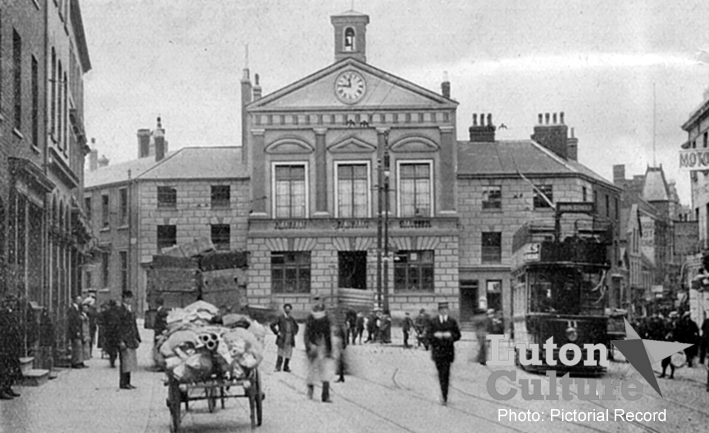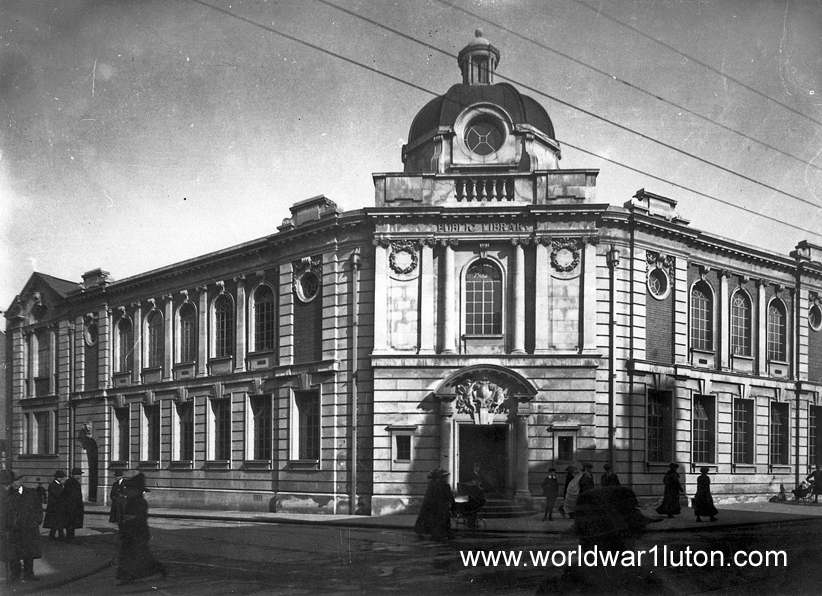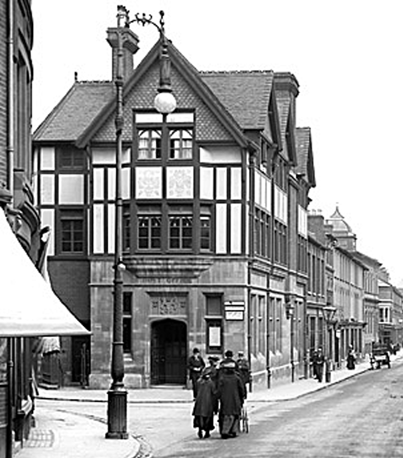
As Luton and Britain as a whole began to look at picking up the pieces of a peacetime economy after four years of war, Board of Guardians member Violet Lewis presented her thoughts on town planning in an article published in the N-T-F & Tuesday Telegraph on December 31st, 1918, as follows:
It is extremely difficult to make any sort of a decent aspect or appearance of a town that has been allowed to expand and enlarge itself without the least forethought on the part of the citizens, as has this town of Luton.
This failing is not peculiar to Luton alone. It is the fate of most towns and cities in England, London itself being a striking example.
Originally, when Luton was little more than an overgrown village, the city fathers of that day evidently did not realise how great would be the expansion in years to come.
In the days when there was an old pond in Market Square with posts and chains lolling picturesquely around it, few people who walked about it then would have thought of the trams that now clank and groan over the very spot, or of the great multitudes that now form the inhabitants of the one-time overgrown village.
Gradually one by one of the old and picturesque landmarks disappeared, nice old properties changed owners and were given over to the merciless hands of the bricklayer to be pulled down, or else transformed in such a manner as to be no longer recognisable.
Beautiful old gardens down Cheapside, Chapel Street and Park Street have all been swept away. In their place we see ugly stacks of bricks and mortar which now answer to the name of premises (good, bad and otherwise).
Of course, it all had to be, but those who love old Luton must think of it always with regret, and something more than regret, when they contemplate the planning of Luton.
The three most important buildings in a town from a citizen's point of view – always excepting the churches – are the public buildings most in use: the Town Hall, the Public Library and the Government building, the Post Office.
Look at these three in Luton and mark the peculiarities, which are precisely the same in each case. Each of these buildings is erected upon a mean and insufficient wedge-shaped piece of land. Why is it Luton runs to the three-cornered idea rather than to the square plot of land? It is most peculiar.

The Public Library can never be a building worthy of the town – past, present or future – even though so much money has been spent upon it; and it is greatly to be deplored that some proper site was no acquired upon which to build the Carnegie gift a few years ago when it was erected. The ground floor rooms are cramped owing to the wedge-shaped site; the staircase, although very costly, fails entirely to impress in that it is forced to end abruptly almost before it has begun. The hall within the building is far too small; while a hall was being built at all, a far better one could have been erected had the site permitted.
The Town Hall is a poor, miserable stucco structure of hideous design. Within, the arrangements are archaic, poor and inadequate. The Hall itself is too small, and the way of access and egress forms a veritable death trap to any concourse of people should there be at any time an alarm of fire during an entertainment.
Imagine the stampede down that twisting stone staircase, the trampling on human bodies and the suffocation that would ensue before the people could get out. The rickety, cramped back stairway is almost, if not quite, as bad; the rooms at the side of the stage queer, odd and poky.
Someone deigned it who had a passion for steps, wherever it is possible one has to step up or step down into every room in the place.
The Council Chamber is a low-ceiled and poor apartment, far too small for the requirements of the town. Already the walls are covered almost up to the ceiling with portraits of city fathers who have rendered service to their town, admitting of no development or room for future celebrities.
As a matter of fact, there is no adequate Town Hall for Luton and, as far as can be seen, no suitable site left upon which a public building of the right sort could be erected, without purchasing premises now otherwise occupied and converting or using the site for a proper building.
It is to be hoped that the Town Council will never attempt the Public Library fiasco all over again by seeking to erect the new Town Hall upon the present cramped site when the day comes for it to be rebuilt, or they might just as well leave it alone. No amount of architecture or plans of any kind will make a really bad site a worthy one.

The present [Cheapside] Post Office is also covering a three-cornered site, and is so miserably small and inconvenient that the authorities were thankful to avail themselves of the offer of the Wesleyan Chapel trustees in Waller Street some time ago, and were thus enabled to transfer a certain congested portion of their business to the Wesley Hall premises.
It is to be hoped in the new Post Office the spaces allotted to the public will not be long and narrow as it is at present. Some days it is quite impossible to enter without brushing hard against every person you pass: this is very unsatisfactory and most unpleasant, but it is caused by the narrow passageway being so much longer than wide.
The air in this building is perfectly appalling. One can only pity the poor employees who have to breathe it for so many hours every day, and wonder how it is they survive in so ill-ventilated a place.
There is another and better site the Government may use one day. At any rate they have had the wisdom to secure it, and let us hope that when the building is ultimately erected, more attention will be paid to existing inconveniences.
As the town develops and grows further and further out Dunstable way, plots of public land should be acquired by the Town Council and laid out as recreation grounds for children to play in. It would be well if there were more of these open spaces than there are. Children are far fitter, healthier and better playing in places provided for them, than they are tearing up and down the streets, racing after trams to the imminent danger of their lives, and the anxiety and annoyance of drivers and conductors, or in riding behind lorries, which so often proves fatal to the children themselves.
Street naming in the early days of Luton's town planning seems to have been a stumbling-block to bygone town councillors. There is a paucity of ideas noticeable, hence we have the intolerable confusion arising out of sameness.
There is George Street, George Street West, Upper George Street. Park Street, Park Square, Park Place, Park Street West, Park Road West. Ashton Road and Ashton Street are at opposite ends of the town, so if one is mistaken for the other it means a great deal of inconvenience for the person who does not know the town well.
Langley Street and Langley Road running one out of the other, and Langley Place not far off. Crawley Green Road one end of the town and Crawley Road the other, and so they go on to the utter confusion and amusement of each newcomer to the town.
All these matter, trifling though they may seem, need serious attention in town planning schemes. Indeed, when considering the lack of originality displayed over street naming in Luton, the American idea of numbers almost commends itself. That numerical system, at any rate, admits of no tiresome and confusing repetition at play on names.
The sewage system is very good now that it has been removed from close juxtaposition to the town, and the public baths are excellent in every particular save the entrance. It was a pity to have the approach marred by a flight of narrow steps scarcely wide enough to take a man's boot, but probably that was done to give as much space as possible inside.
Many ideas suggest themselves in the adsorbing study of town planning, too many to enumerate here. The greatest ideas of all should be space, adequate street room, adequate pavement room, buildings that admit of proper air space, floor space and ground space.
Town councillors in these progressive days must look ahead - beyond the village pump, so to speak - and keep ever before their eyes the ultimate needs and requirements of a fast becoming great modern industrial town such as the Luton of today.

